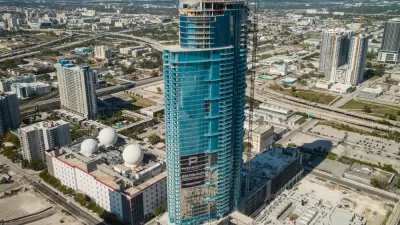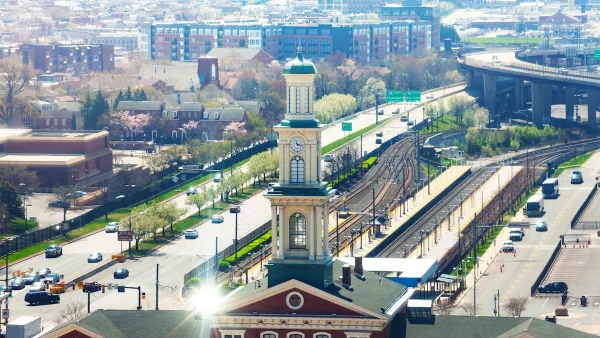Last minute changes allowed the $1.5 billion Worldcenter development to move forward into the planning stage.
"The Miami City Commission unanimously voted in favor of zoning changes and a development agreement for the $1.5 billion Miami Worldcenter project," reports David Smiley. The vote will allow developers to submit their plans for the site to the west of downtown.
Worldcenter developers "needed the commission approvals Monday for a special zoning plan and new development agreement after sitting for nearly a decade on the land, located in a blighted neighborhood to the west of downtown. Worldcenter has been planned as a massive retail, hotel and residential complex stretching from 11th Street to Sixth Street, and from North Miami Avenue to Second Avenue.
Smiley also describes the public controversy that surrounded the development plans—on one side are residential and business interests who hope the project will be a catalyst for the area; on the other side are critics with concerns about the terms of the deal that "would allow the developer to privatize public streets for free, cluster bars into an intense nightlife district and erect gaudy billboards."
At the last moment, the development agreement for the project was adjusted "to clarify that any signage on site has to comply with Miami’s new zoning code, and to require that Worldcenter pay a fee should it build over or under any public street."
FULL STORY: Miami commission approves Worldcenter agreement

Planetizen Federal Action Tracker
A weekly monitor of how Trump’s orders and actions are impacting planners and planning in America.

Restaurant Patios Were a Pandemic Win — Why Were They so Hard to Keep?
Social distancing requirements and changes in travel patterns prompted cities to pilot new uses for street and sidewalk space. Then it got complicated.

Maui's Vacation Rental Debate Turns Ugly
Verbal attacks, misinformation campaigns and fistfights plague a high-stakes debate to convert thousands of vacation rentals into long-term housing.

In California Battle of Housing vs. Environment, Housing Just Won
A new state law significantly limits the power of CEQA, an environmental review law that served as a powerful tool for blocking new development.

Boulder Eliminates Parking Minimums Citywide
Officials estimate the cost of building a single underground parking space at up to $100,000.

Orange County, Florida Adopts Largest US “Sprawl Repair” Code
The ‘Orange Code’ seeks to rectify decades of sprawl-inducing, car-oriented development.
Urban Design for Planners 1: Software Tools
This six-course series explores essential urban design concepts using open source software and equips planners with the tools they need to participate fully in the urban design process.
Planning for Universal Design
Learn the tools for implementing Universal Design in planning regulations.
Heyer Gruel & Associates PA
JM Goldson LLC
Custer County Colorado
City of Camden Redevelopment Agency
City of Astoria
Transportation Research & Education Center (TREC) at Portland State University
Camden Redevelopment Agency
City of Claremont
Municipality of Princeton (NJ)





























